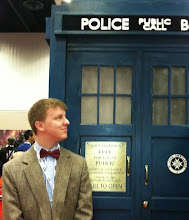One more thing about today’s nominations. I like the Oscars
because there’s a sense of legacy to the flawed institution and it gets to
reward those who aren’t typically rewarded. I really can’t care about Oscar
snubs for Robert Redford and Tom Hanks because I’m going to go out on a limb
and say they’re probably going to be okay. Instead let’s focus on the unheralded
who did some amazing work.
What I was really happy to see was K.K. Barrett and Gene
Serdena’s nomination for the film Her.
There have been so many tweets and Facebook posts lately about what all “needs”
to happen within the next year to make Back
to the Future II accurate. Those are amusing (well mostly repetitive) but
that was never meant to be a fully realized science-fiction world. It’s a fun
satirical look at different aspects of culture that are all jumbled together to
make for an entertaining romp.
Why I love Her so
much is that it’s not a glimpse of our future, but a future we wish we had. I
started to notice halfway through the movie that I hadn’t seen a single
corporate logo. The OS system that Theodore uses doesn’t have an apple on it or
even a name. Everywhere he walks, there aren’t billboards screaming about things
to buy. He does get the occasional junk email but he is able to get a system in
place to ignore those for him. The elevators are clean, the offices are
colorful and the homes are filled with items not products.
Her has a world
where society has evolved to become user-friendly, not corporation friendly.
It’s shockingly nice. There were two times during the plot I was worried that a
lawsuit was going to break out, but that never happened. There is civility
amongst everyone because in this magical world, people are just trying to
connect with one another. When Theodore sits for a moment near the end of the
film and watches everyone on their mobile devices, they’re not looking like
drones. They are engaging and talking and happy. This isn’t a world of
distractions, but a world to focus on the things that matter the most to us.
These types of worlds are rarely depicted because the boring
conclusion to technology is that it’s bad and evil and we need to only use
quills because that’s what our Founding Fathers had. Other than ignorant/boring
luddite approach, futuristic stories often use technology as a foil because
that’s where the conflict arises. Spike Jonze has taken the (in retrospect)
obvious approach in that concept and realized that people inherently create
their own drama in their journey to be happy.
Barrett and Serdena created a world where people try to
fulfill their happiness through their lifestyle without commenting on
consumerism. Money is rarely brought up in the world, often only when it’s
being rejected. Chris Pratt’s character of Paul is complimented about his shirt
from Theodore and then is seen wearing it a couple of more times throughout the
film. That shirt wasn’t about how much it cost or what brand it is; it’s about
how that shirt made him connect to Theodore.
When Theodore talks to his date about the video game, it
isn’t about the top-of-the-line graphics but about the connection he had with
one of the characters. He doesn’t even own a TV to play it, but lets it
surround him in a room as if it was tangible as anything else in his life. This
focus on a richer importance seemed to make a superior product because nothing
is seen malfunctioning in the world. Theodore can always get the letters sent,
voice-command to listen and the videos to play exactly when you want them to.
Now I’ve given credit to a lot of people in this including
Jonze as a screenwriter and (not-nominated) costume designers. Yet it was
Barrett and Serdena that made me realize how this world functioned and they did
so in an intelligent and non-flashy way. I can’t wait to see the movie again
for a number of reasons, but I want to look even closer at the way this world
reflects the kindness and peace the characters want for themselves and others.






No comments:
Post a Comment